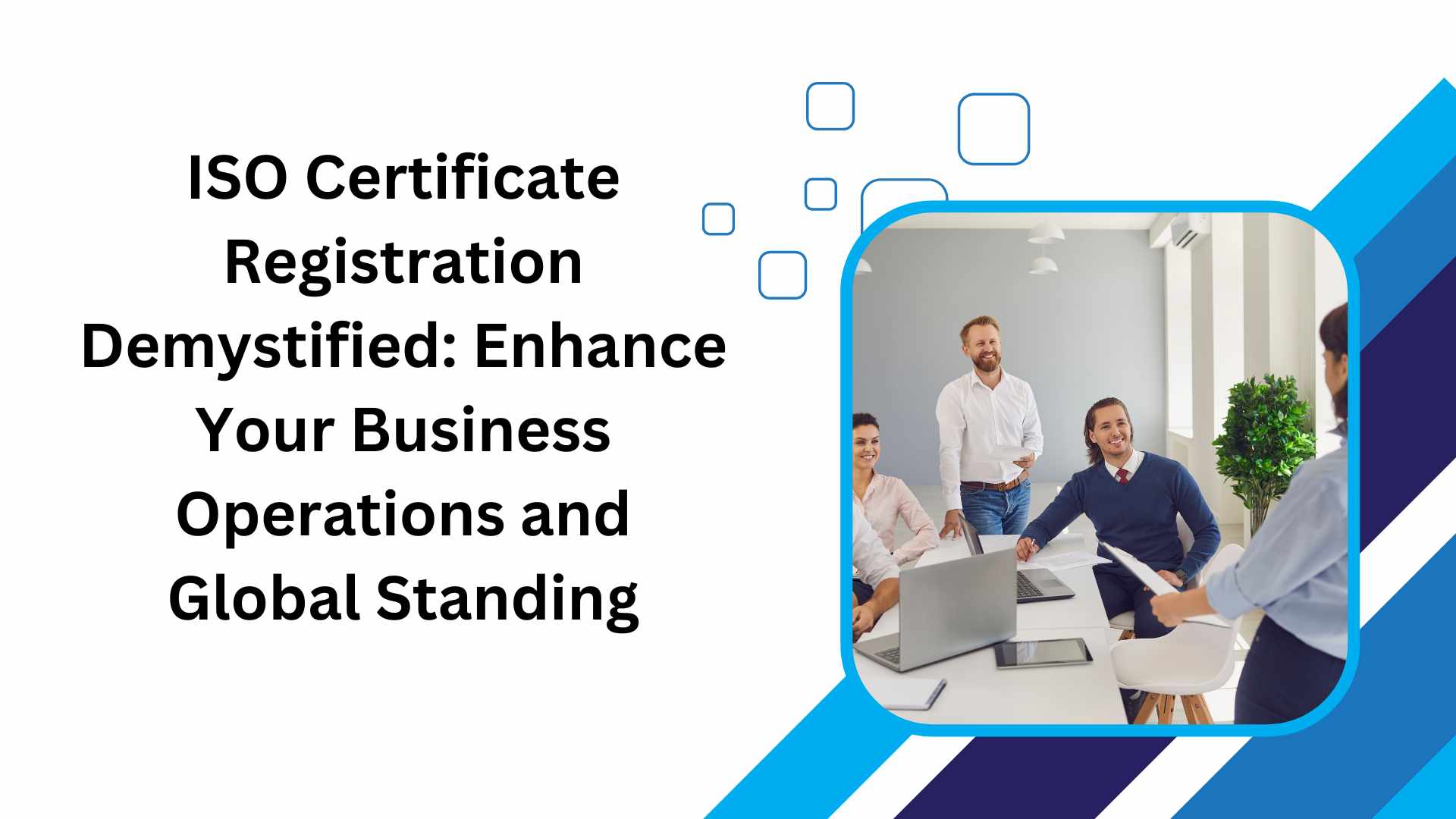Introduction
In today’s competitive business environment, maintaining operational excellence and demonstrating commitment to quality, safety, and efficiency can significantly boost a company’s reputation and performance. An effective method to accomplish this is by obtaining ISO Certification. But what exactly does ISO certification entail, This article aims to demystify ISO certificate registration, highlighting its significance, process, and benefits to enhance your business operations and global standing.
Understanding ISO Certification
ISO, the International Organization for Standardization, is an independent, non-governmental body that creates and publishes global standards.. These standards cover various aspects of business operations, including quality, safety, environmental impact, and efficiency. ISO certification signifies that a company adheres to these internationally recognized standards.
Types of ISO Certifications
ISO offers a wide range of certifications tailored to different business needs:
1. ISO 9001: Quality Management System (QMS) – Focuses on ensuring quality in products and services.
2. ISO 14001: Environmental Management System (EMS) – Addresses environmental impact and sustainability.
3. ISO 45001: Occupational Health and Safety (OHS) – Ensures a safe and healthy work environment.
4. ISO 27001: Information Security Management System (ISMS) – Protects sensitive information and data.
5. ISO 50001: Energy Management System (EnMS) – Promotes efficient use of energy and reduction of energy costs.
The Importance of ISO Certification
1. Enhanced Credibility and Reputation
ISO certification enhances a company’s credibility by demonstrating its commitment to industry standards. It provides a competitive edge in the marketplace, as customers and partners often prefer to engage with certified companies due to their proven adherence to high standards.
2. Improved Operational Efficiency
ISO standards promote the adoption of best practices and streamlined processes. For instance, ISO 9001 encourages a systematic approach to managing quality, which can lead to reduced waste, improved processes, and greater overall efficiency. This operational excellence translates into cost savings and increased productivity.
3. Regulatory Compliance
Many ISO standards are aligned with regulatory requirements. Achieving certification helps ensure that your business complies with relevant laws and regulations, minimizing legal risks and potential fines.
4. Risk Management
ISO standards, such as ISO 27001, are designed to identify and mitigate risks. By implementing these standards, businesses can safeguard against potential threats, whether related to quality, security, or environmental impact.
5. Customer Satisfaction
ISO certification often leads to improved customer satisfaction. For example, ISO 9001 helps companies enhance their product quality and service delivery, leading to higher customer trust and loyalty.
The ISO Certification Process
Obtaining ISO certification involves several key steps:
1. Identify the Relevant ISO Standard
Start by selecting the ISO standard that best fits your business needs. Conduct thorough research to understand the requirements and benefits of the standard to ensure it aligns with your specific objectives and challenges.
2. Visit the Certification Website
Access the ISO certification website at isoregistrar to begin the certification process.
3. Fill Out the Application Form
Complete the online application form available on the site. You will also need to make a nominal payment as part of the application process.
4. Submit Your Application
After filling out the form and processing your payment, submit the completed application form through the website.
5. Application Verification
A representative will review your payment and application details to verify the information.
6. Confirm Your ISO Certificate
A consultant will reach out to you to finalize which ISO certificate you are applying for and to confirm your selection.
7. Receive Your Certification
Once all procedures are finalized, you will receive your ISO certificate via email at the address you provided during registration.
Benefits of ISO Certification
1. Competitive Advantage
ISO certification can set your business apart from competitors. It signifies a commitment to quality and excellence, which can be a decisive factor for clients and partners when choosing between different suppliers or service providers.
2. Access to New Markets
ISO certification is recognized globally. It can unlock access to new markets and global opportunities, as many companies and governments mandate ISO certification for their suppliers.
3. Enhanced Employee Morale
ISO certification often leads to improved workplace practices and environments. Employees feel more engaged and motivated when working for a company that values quality and safety.
4. Increased Efficiency and Cost Savings
By streamlining processes and improving operational efficiency, ISO certification can lead to significant cost savings. Efficient processes reduce waste, lower operational costs, and enhance profitability.
5. Better Customer Relationships
A certified company is often perceived as more reliable and trustworthy. This perception can strengthen customer relationships, enhance customer satisfaction, and increase client retention.
Common Challenges and Solutions
1. Cost of Certification
The initial cost of ISO certification can be a barrier for some businesses. However, the long-term benefits, such as improved efficiency and access to new markets, often outweigh the initial investment. Consider it as a strategic investment in your company’s future.
2. Resource Allocation
Implementing ISO standards requires time and resources. To overcome this challenge, involve a dedicated team and provide adequate training to ensure a smooth transition.
3. Maintaining Compliance
Maintaining ISO certification requires ongoing effort. Regular audits and continuous improvement initiatives are necessary to keep up with standards and ensure continued compliance.
Also Read: ISO 14001 Environmental Management System
Conclusion
ISO certification offers numerous benefits, including enhanced credibility, improved operational efficiency, and access to new markets. By understanding the ISO certification process and addressing common challenges, your business can leverage ISO standards to achieve operational excellence and global recognition. Embracing ISO certification is not just about meeting standards but about committing to a culture of quality, safety, and continuous improvement. Investing in ISO certification can lead to significant long-term advantages, positioning your business for success in a competitive global marketplace.




